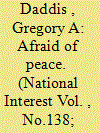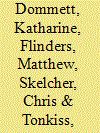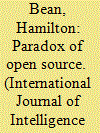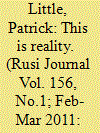|
|
|
Sort Order |
|
|
|
Items / Page
|
|
|
|
|
|
|
| Srl | Item |
| 1 |
ID:
138999


|
|
|
|
|
| Summary/Abstract |
EARLIER THIS year, West Point’s Defense and Strategic Studies Program invited me to participate in a panel discussion on the future of warfare. For historians, and particularly for Vietnam War students like me, such requests seem fraught with peril. Given the contentious debate that continues to surround America’s involvement in Vietnam, now fifty years after Lyndon Johnson’s fateful decision to send ground combat troops to Southeast Asia, commenting on the future of warfare obliges conjecture without much evidence. Yet for uniformed officers considering strategic issues and the use of military force, these questions surely are as sensible as they are unavoidable.
|
|
|
|
|
|
|
|
|
|
|
|
|
|
|
|
| 2 |
ID:
133232


|
|
|
|
|
| Publication |
2014.
|
| Summary/Abstract |
Attitudes to quangos are paradoxical. On the one hand they are perceived to be undemocratic, unaccountable organisations, while on the other they are seen to improve effectiveness, limit political interference and increase public confidence in government. This paradox is reflected in the behaviour of political parties, which generally adopt a harsh line towards quangos in opposition, but come to rely on these bodies in office. Ahead of the 2010 general election it was, however, noticeable that the Conservative party rejected this dynamic by promising to pursue 'a more sophisticated approach'. This article explores the Coalition government's subsequent 'public bodies reform programme', assessing its progress against recommendations contained within the Institute for Government's Read before Burning report of July 2010. It concludes that while the Coalition has addressed long-standing concerns about the day-to-day governance of public bodies, it has failed to resolve a set of broader and strategic (metagovernance) issues.
|
|
|
|
|
|
|
|
|
|
|
|
|
|
|
|
| 3 |
ID:
130227


|
|
|
|
|
| Publication |
2014.
|
| Summary/Abstract |
The Associated Press (AP) reported on 8 November 2005 that, as part of post-11 September 2001 (9/11) United States intelligence reform efforts, the Director of National Intelligence (DNI) had established the Open Source Center (OSC). 1 Then-Director of the Central Intelligence Agency (CIA), former Florida congressman Porter Goss, described the OSC as a "major strategic initiative and commitment to the value we place on openly available information." 2 Challenging Goss's statement of commitment, the AP asserted that the OSC had actually been created, in part, in order to "elevate a brand of information [open source] that's long been a stepchild in the U.S. spy community." 3 Directed to "collect and study information that's publicly available around the world, including media reports, Internet postings and even T-shirts in Southeast Asia," 4 the OSC described itself as "the US Government's premier provider of foreign open source intelligence." 5 Visitors to the OpenSource.gov Website were told that the OSC offered authorized government employees and contractors "information on foreign political, military, economic, and technical issues beyond the usual media from an ever expanding universe of open sources
|
|
|
|
|
|
|
|
|
|
|
|
|
|
|
|
| 4 |
ID:
104743


|
|
|
|
|
| Publication |
2011.
|
| Summary/Abstract |
Restrepo stands amongst the very best documentaries of military conflict in the twenty-first century. It sheds revealing light both on the oft-overlooked US Army presence in the Korengal Valley and, more generally, on the lives and actions of soldiers in conflict. For a military audience in particular, the film may serve as a catalyst for reflection upon a broad array of strategic issues.
|
|
|
|
|
|
|
|
|
|
|
|
|
|
|
|
|
|
|
|
|